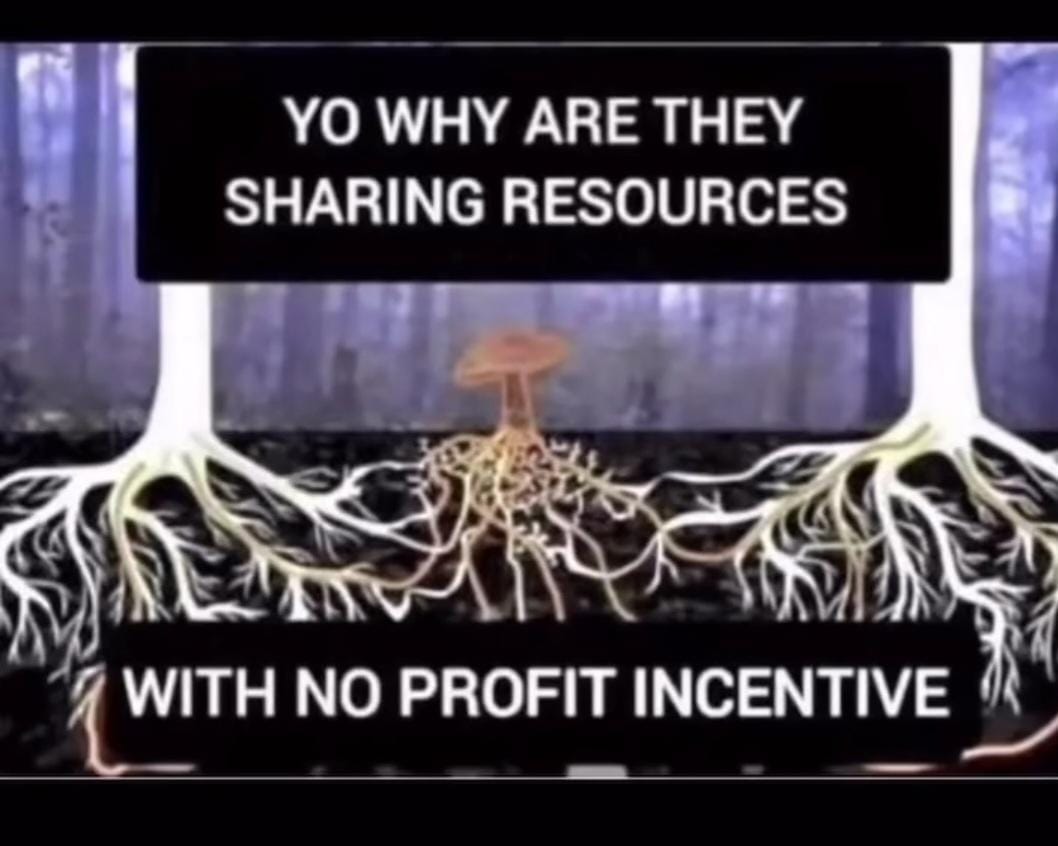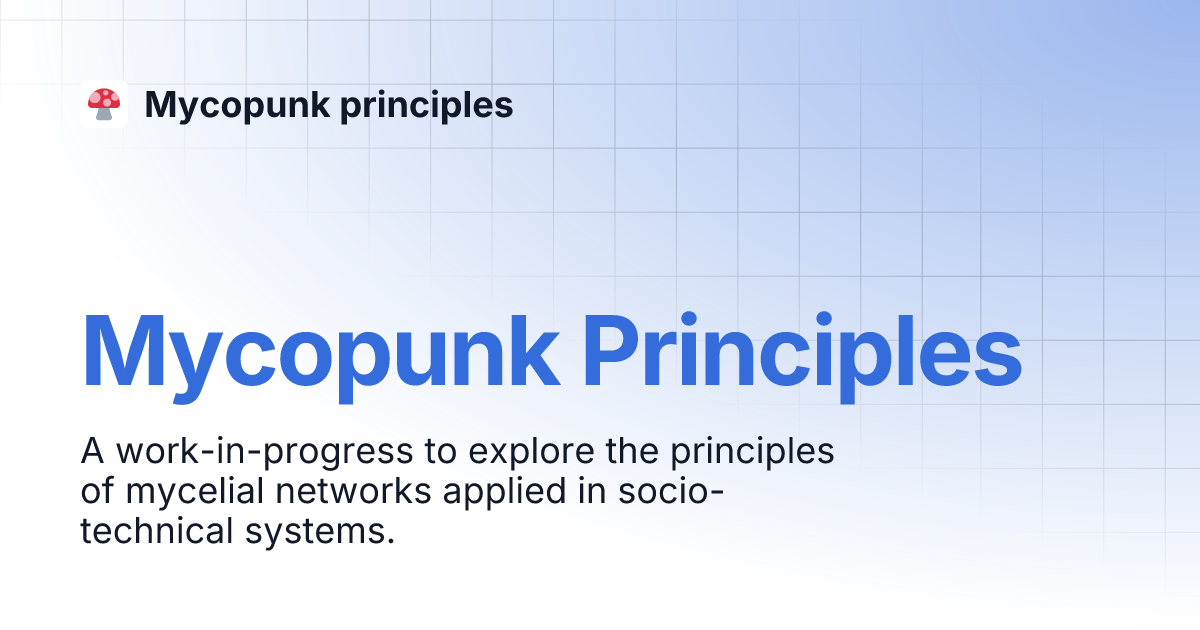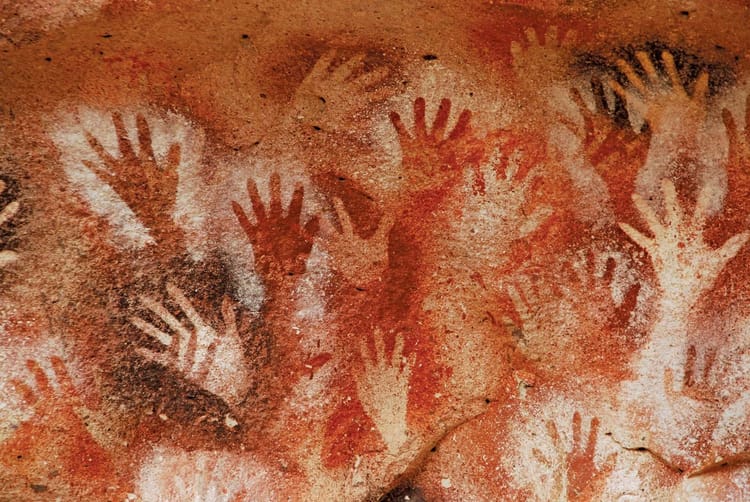It's digital meth. I deleted it immediately.
- Jim Rutt talking about TikTok
You know the addiction.
Doom scrolling. Hours of seeking connection, of tapping into the dopamine-driven algorithmic hypnotism that shapes our current social media landscape. If you've not fallen in yourself, you likely know friends or family who feel the daily undertow of social feeds. Love it or hate it, very few of us would claim that our current social landscape is healthy, or serving the needs of humanity.
The numbers tell the story our bodies already know:
- the average person checks their phone 58 times per day, spending around 5 hours staring at screens.
- In the US, usage stats are nearly 4x that, with people checking phones nearly once every 5 min, or 205 times a day.
- The jerk of a reflexive reach for devices sneaks into our quiet moments, interrupts real conversations with an internal urge to check updates.
- We feel irritation when our kids ignore us in favor of their own devices, yet we scroll past authentic moments in our friends' lives.
Simultaneously overwhelmed by information and starved for genuine connection, we keep scrolling. Social platforms promise to bring us together, but do not. Designed for data and attention extraction, these content distributors optimize for the division and outrage that drive engagement at all costs. We're left feeling more isolated, anxious, and scattered than before.
The Rise of #SlowSocial
Like the "slow food" movement - a farm-to-table effort to resist the fast-food industrialization of local food systems - #SlowSocial poses a counter to the overwhelming algorithmic, attention-extractive platforms. These platforms - like the fast-food industry - are driven by the homogenization, industrialization, and commodification of our relationships. Brains - like our topsoil - feel the erosion.
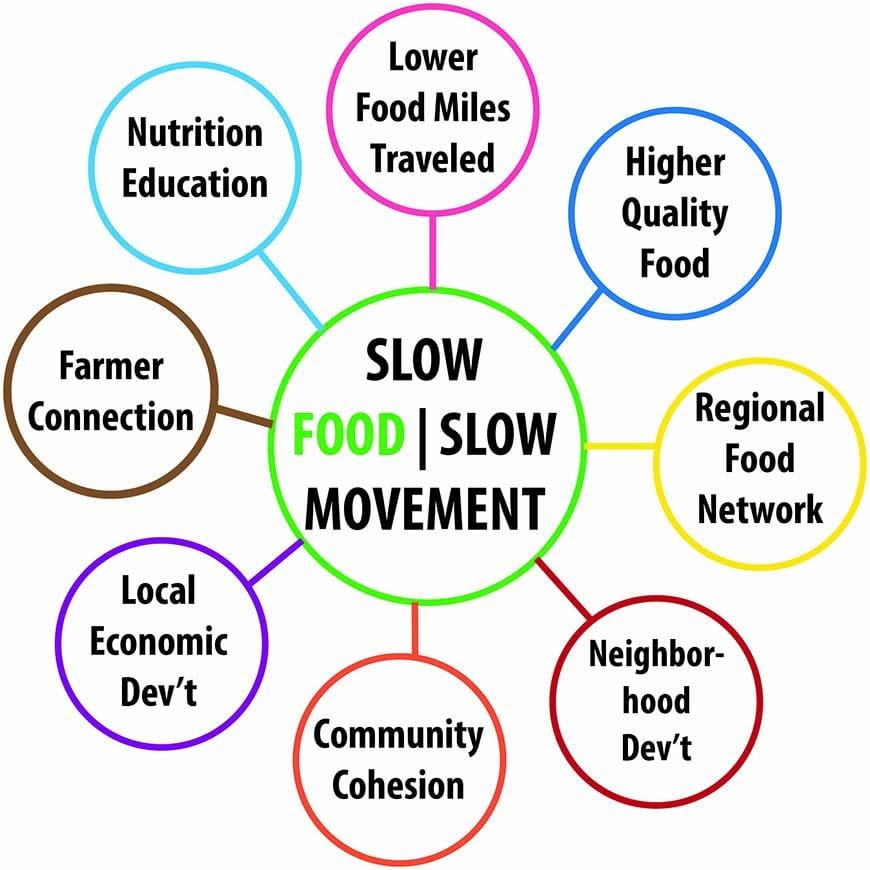
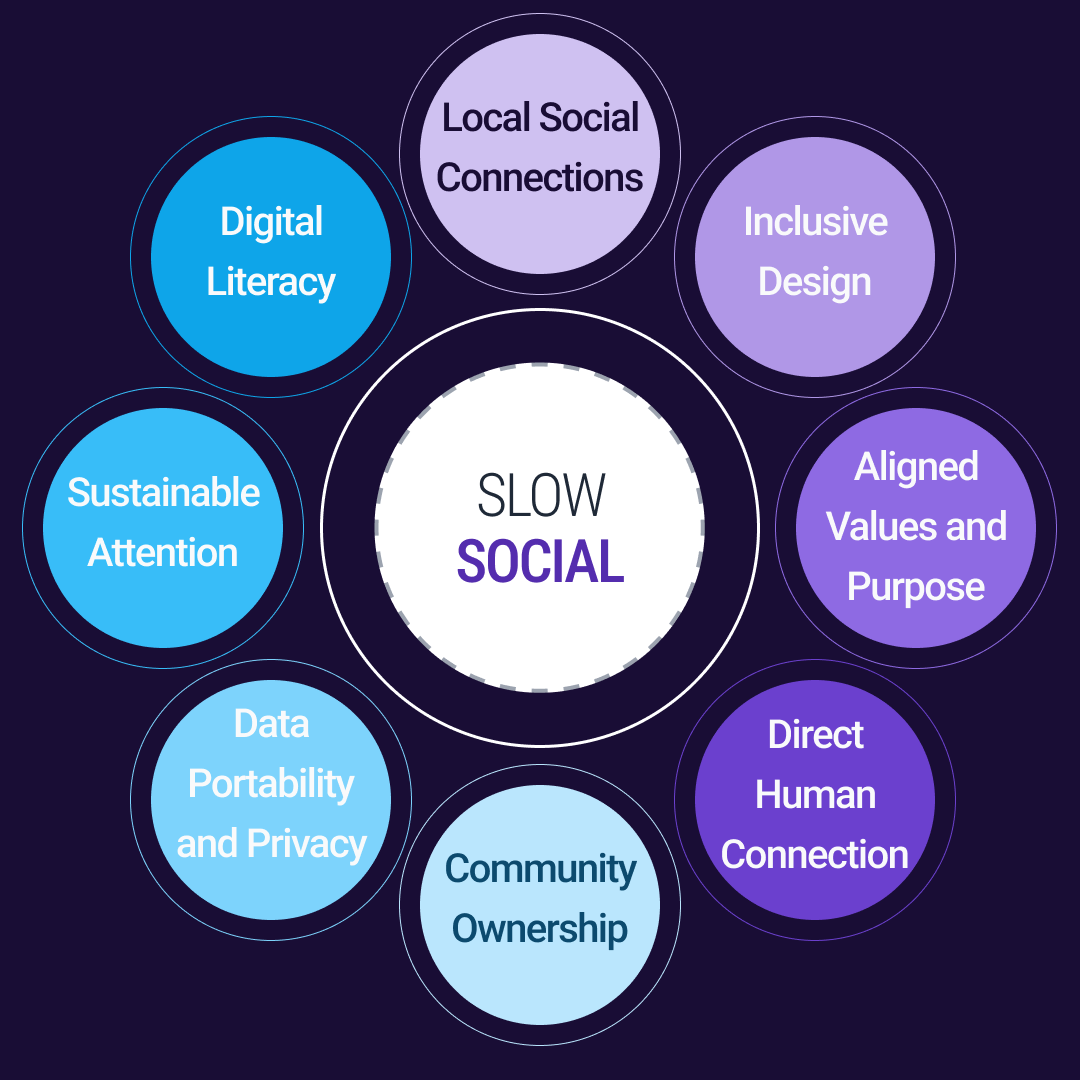
The slow movement - across food, fashion, money, parenting, and more - sets the stage for #SlowSocial.
The cure for our fractured attention isn't logging off and moving to the wilderness - it's building digital spaces shaped for more natural human connections. Spaces designed for coordination and action rather than extraction and distraction. More democratic spaces, with meaningful ownership of software and especially of our data. People long for community, for a different vision of our digital social landscapes.
A #SlowSocial movement is taking form.
From Tristan Harris' provocation A Call to Minimize Distraction & Respect Users’ Attention, that turned into the 'time well spent' movement, to resources like Tactical Tech's Data Detox guide, or the wealth of content from thinkers like Amber Case and the beautiful Calm Tech Insitute, to mass migrations off platforms like X/Twitter and Facebook, we are collectively questioning big tech assumptions about whether we should feed the algorithm, and how tech is designed.

“A wealth of information creates a poverty of attention.”
– Herbert Simon
ht/@MichaelGarfield for the Herbert Simon quote above. See "Humans on the Loop" for thoughts on navigating high-dimensional information ecosystems and more.
The question of what we feed with our attention, our data, our economies is even more pressing with the surge in AI. We will need many new ways to navigate our new and rapidly changing information landscapes. Slow social offers us an open pathway that starts right where we sit.
I first remember thinking about "slow social" when bumping into Ben Grosser on 2018 Twitter, with the launch of his "Twitter Demetricator". With the ubiquitous metrics hidden, my social intake slowed down - and my processing capacity increased - because some of the urgency-by-design was gone.
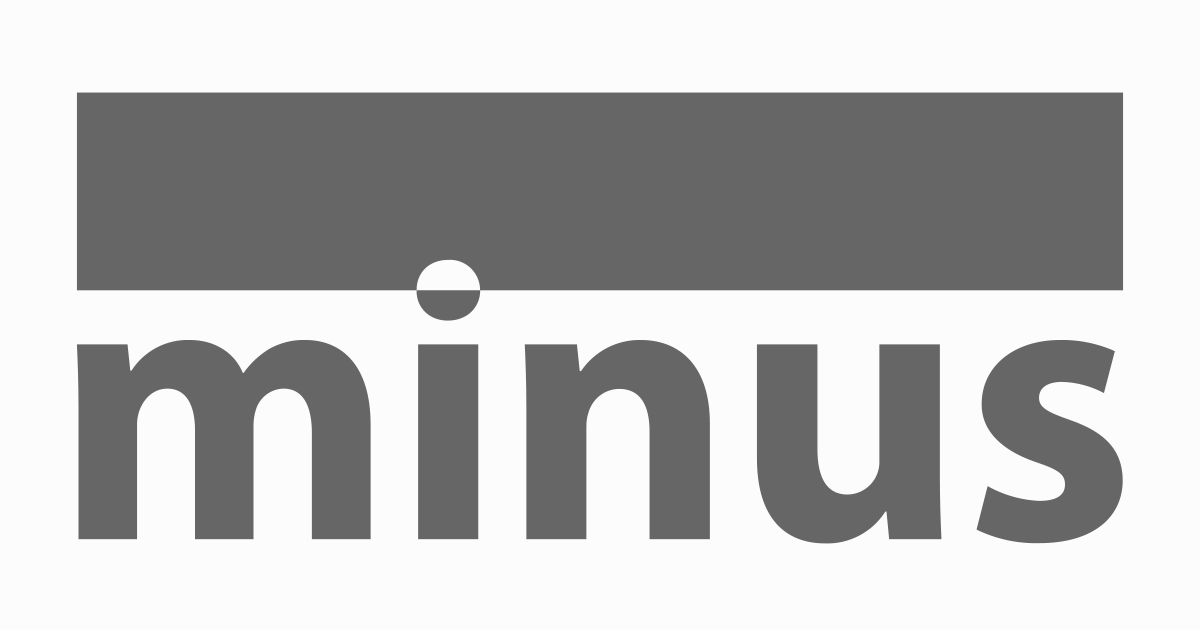
Grosser went on to build "Minus", a social network with limits.
Slow social felt good. It's a concept that's stuck with me.
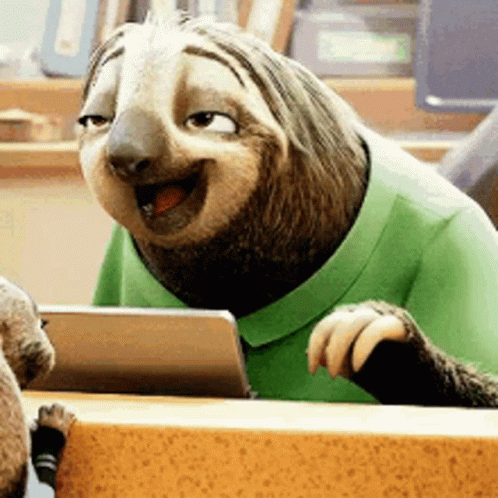
That same year, the Internet Archive and friends convened the Decentralized Web Summit, catalyzing global DWeb community aiming to 'lock the web open'. Brewster Kahle and Tim Berners-Lee each spoke about the widening gap between the original vision of the Web and the centralizing and extracting forces that shape its current reality. Similar concerns about technology had attracted many to the Summit. Founders and hackers from all over the world shared ideas about how to build the internet and tech tools that worked for people. As I explored the space, I built a network map to navigating this emerging ecosystem of projects, still available as a projects directory on the DWeb site. The DWeb is now a week-long camp, also supporting local DWeb gatherings around the world.
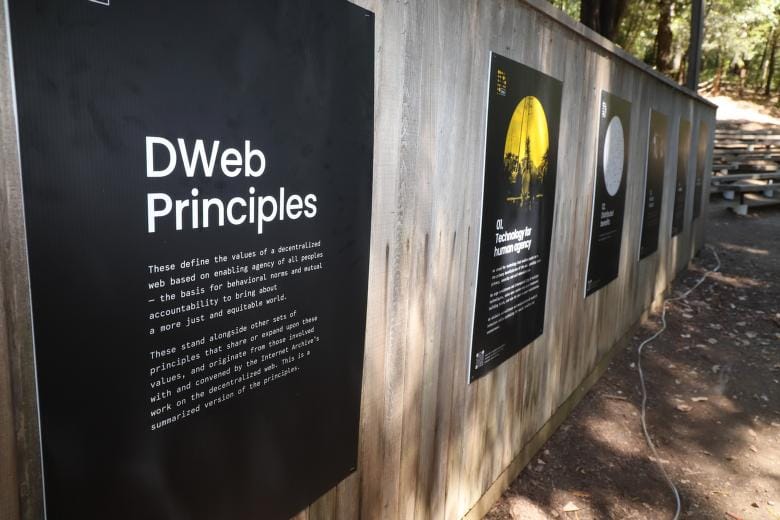
Across a wide variety of fields, communities, and voices there's clear call for a more mindful approach to our social web, and tech at large. The design and implementation of technology is being scrutinized and public literacy is growing. We are learning the consequences of global public social media. We are starting to more effectively question and challenge the assumptions and incentives that influence what tech gets built, and how our social webs are designed.
#SlowSocial needs to be combined with things like the DWeb principles in order to fully re-imagine digital spaces in ways that foster genuine human connection, serve real human communities, and align with democratic values. We need stable places to work, and alternative economic and ownership models underpinning technology. For example, the Metagov research community is looking at how we collectively govern both our communities and our digital spaces. The work of DisCO - 'distributed cooperatives' for radical workplace democracy - gives ways to create new relationships of care with not only our tech, but each other. Are you part of communities that could foster small-d democratic practices? Those could be a place to start.
Wandering the CozyWeb
Alongside #SlowSocial in the mindmap of my brain sits the concept of the 'cozyweb'. Fascinated by the DWeb ecosystem of technologies aimed at a more democratic and human web, my ecologist brain dug in to look in branches and under rocks in this emerging community. I found myself invited to explore new digital spaces that felt very different than the social feed streams. Discord servers, Signal chat groups, and other smaller digital spaces started to join the community newsletters and small forums that had shaped my experience of the social web before 'media' was added to the term. Higher trust, cozier spaces.

Venkatesh Rao coined the term 'cozyweb' for these overlapping smaller spaces where humans connect. Maggie Appleton describes it well in her take on Rao's original article below:
The informal, untracked, messily human space that the bots and algorithms haven’t infiltrated yet.
- Maggie Appleton on the cozyweb
Cozyweb spaces pair well with the wild, often frightening 'dark forest' of the interwebs. They provide a more human-scale chance to explore and connect, as well as an escape (so far) from (most) ad tech and dopamine hijacking.
Cozyweb spaces create not only connection, but healthier boundaries. Programmer, gardener of communities, and deep cooperator Mix Irving talks about using Signal chats to segment conversations for relational health in "Cybernetic Signal". Within these sorts of intentionally designed small spaces, deeper connections can grow. Conversations lengthen. Careful stewarding of small social spaces helps create intimacy gradients. People gain the space - and the context - needed to be able to build relationships, to loop back to ideas, to explore the unknown, to more truly listen to each other.
Democratic Tech Principles in Practice
For slow social and the cozyweb, the tech stack matters
The DWeb community alone pulled me into more cozyweb spaces than I know what to do with. Cozy as they are, silos proliferate, and contribute to information overwhelm. Without #SlowSocial practices and design, the cozyweb still gets overwhelmingly loud. But both slow and cozy technologies fail us when created in 'walled gardens' - corporate owned spaces with incentives for profit and data mining that do not align with thriving communities. The DWeb calls for tech that supports human agency, a prerequisite for practical coordination and action. The vision of the DWeb aims at that more democratic, more decentralized, more deliberately and humanely built tech. We need these various movements to connect and inform each other. Together, these overlapping movements create a larger shift that's collectively reshaping how we think about social technology, human connection, and democratic values in digital spaces.
So why not just design for these slower, cozier spaces? Misaligned financial incentives, of course. Without incentives that support the manifestation of DWeb's vision to 'lock the web open', our collective social web will work for profit, not for people. The slow social designs and practices that can protect our attention need support from the healthy boundaries of the cozyweb, which in turn need the DWeb and other ethical tech movements. Open software and protocols can help people escape the walled gardens where users may be cozy, but are trapped without control or portability of their data. And to work, this all needs funding aligned with interests of people and planet. Ownership and control of our social web cannot rest on the whims of billionaires.
Find a space to explore!
In the slow-moving, high trust communities aligned with these movements, other promising experiments are emerging: community-governed Mastodon instances, cooperatively-owned social coordination tools (including Socialroots), and subscription-funded newsletters that put readers before advertisers. (Ghost - the tool we use for this blog - now helps you find readers on the open social web!). These aren't just alternative products—they're alternative economic models aimed at re-aligning incentives with human flourishing.
Co-create the social web we want
If technology of, for, and by people is the aim, Rabble (Evan Henshaw-Plath), first Twitter employee, DWeb community member, and one of my team's advisors, summarizes it well: “We need to build it so that people can collectively solve the problems of the world.” A current summary of their thinking on how to do this is available as a proposed Social Media Bill of Rights:
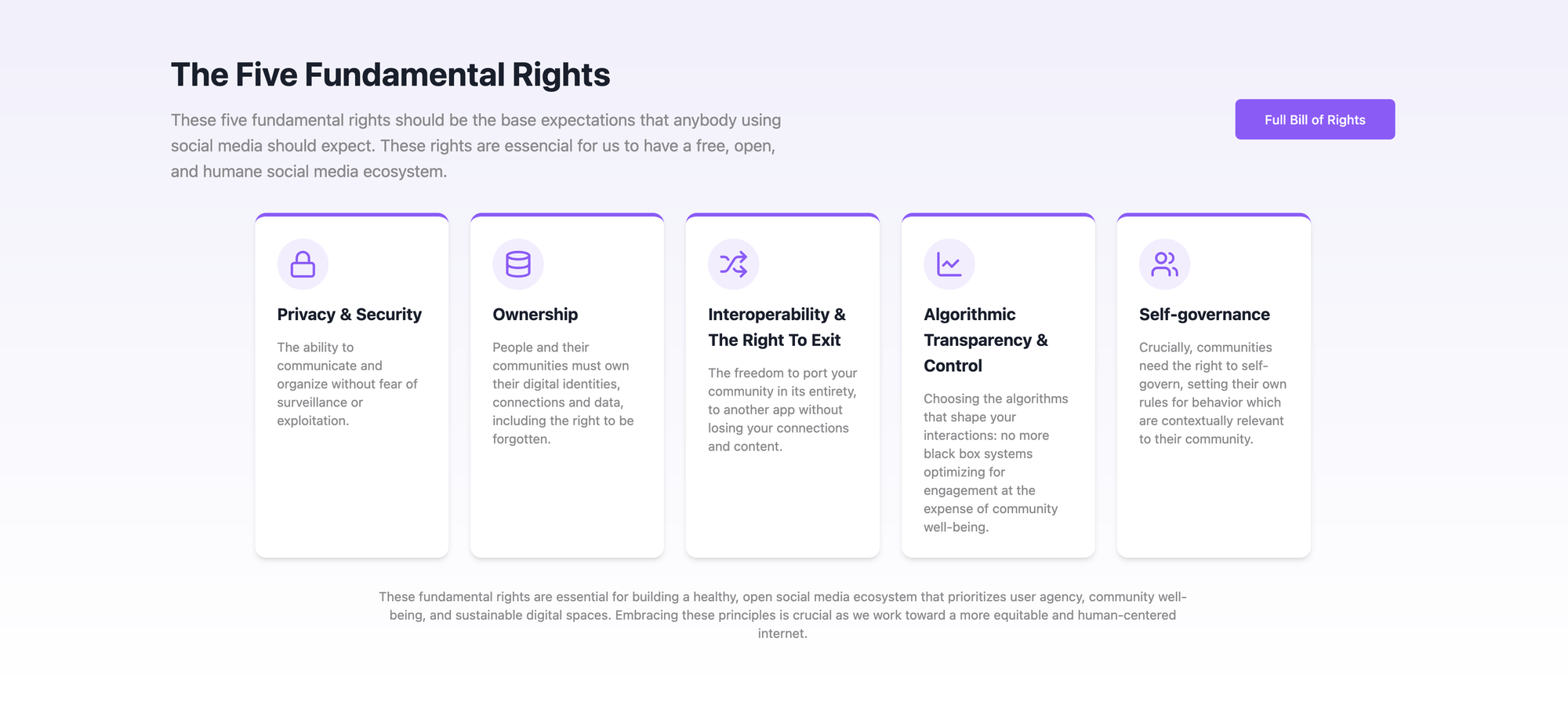
Individual practices - or even rights - and humane design are not enough.
Healthy group boundaries with alignment and coherence is not enough.
A values-aligned tech stack is not enough.
We need all of them. A socio-technical stack. Digital infrastructure built for life. Community-led, more ethical, humane, and sensible tech. Aligned and more democratic ownership and control of our tech and our data. Incentives for working together that do not pit us against each other.
We need erosion control and nurturing for our collective mind, for the next social web to spring the dark forest of the internet.
Slow down and get cozy for better digital health
The erosion of our collective attention can be reversed, but it requires us to tend new growth: slower practices, cozier boundaries, and democratic ownership of our digital infrastructure. Look for tools designed around coordination rather than consumption: tech to help you get things done with others instead keep you scrolling through. Look at who owns the data. Look at how you feel when you interact.
Start Small
- Choose one extractive platform to use more mindfully (or go ahead and leave Faceborg)
- Join or create one digital space that's stewarded as a cozyweb space.
- Practice one 'attention boundary' (like turning off notifications or looking at your screen time once a week)
Common Obstacles
- Network effects ("but everyone's on ______!")
- Before you migrate, make a plan to stay connected with people who matter most to you.
- Notice the sucking sound of data extraction and enshittification. Consider the impacts of perverse incentives driving these tech monopolies.
- As you build connections in new spaces, the pull of extractive platforms naturally weakens. As you leave, you enable others to exit that toxic relationship. Weaken the bind your friends are in by disentangling from extractive platforms, making it easier for them to escape.
- Learning new tools
- Can you get rid of one (or more) spaces as you add one?
- To make it worth the switching costs, choose spaces not based on what tool will 'replace' global town squares of collective individualized social doomscrolling. Look alignment, for a community that will bring you connection and learning.
- Use the chance to deepen your existing connections. Is there a newsletter you already read regularly (unsubscribe from those you don't 📤)? Maybe they host a community space.
Digital health is more fun with friends
- Let others know how you're thinking about and exploring digital spaces, whether in those spaces, or at your dinner table.
- Ask others how they navigate spaces they joined or their attention budget. Connect with communities working for healthier ownership, design, and funding of our digital common spaces.
- Notice how you feel after you've interacted in a digital community, and follow your heart. Try to notice when a digital tool hijacks your nervous system.
We need to rewild the internet
In their powerful essay We Need To Rewild The Internet, Maria Farrell and Robin Berjon made a clarion call not only to technologists but to all of us. If we use tech, we need to help shape it. Ecologists, parents, sociologists, policy makers, contractors, farmers. All of us. The movements to help create the tech we want are early, and still fragmented, but are starting to connect. Where they do, we see restored attention and respect for brainspace.
Imagine a wider shift to slower, cozier spaces in our daily routines, and across our communities. Imagine real data sovereignty. Imagine digital experiences that help shift us away from performative arguments in public feeds, into more purposeful connections with each other. Imagine technology aligned with life flourishing rather than corporate extraction. Rather than anxiety, what if 'social' meant relaxing, unwinding into our shared web of relationships, ideas, and dreams. What if it also helped us coordinate meaningful action on things that matter most to us, together?
As we begin to untangle the coils that keep extracting our attention for profit, connections get deeper. Communities can start to nurture members rather than just sell to or extract from them. Ownership is discussed.
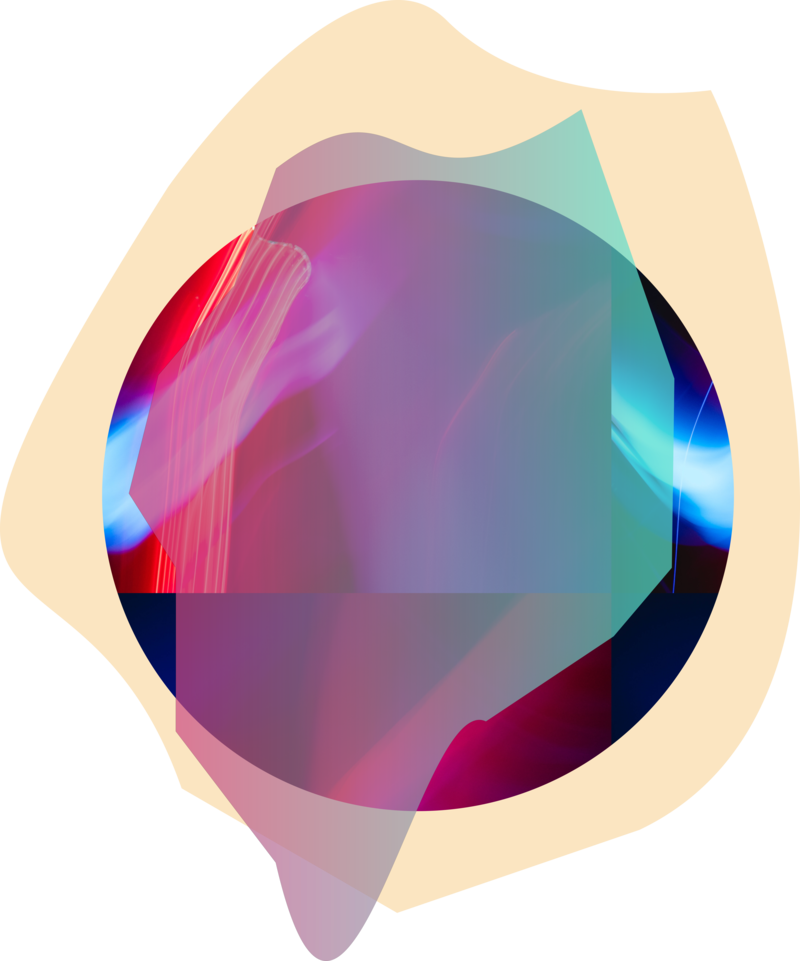
Across the wild spaces of the internet, we can reconnect and help each other. A life-centered digital future isn't just about changing individual habits. It's part of a larger cultural shift, a paradigm shift from extraction to regeneration. It's an awakening to the possibility of more intentional, more wise (not just smart) technology.
Christina Bowen is a co-founder of Socialroots, a cooperatively-owned social coordination network designed around collective action rather than endless feeds. As a knowledge ecologist she explores the intersections of technology and human communities.
Excited about this vision for new digital landscapes?
Help build a cross-group coordination network built as a digital commons.
Socialroots takes a #SlowSocial approach to support networks working together to address our messiest problems.
